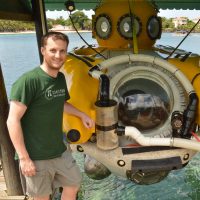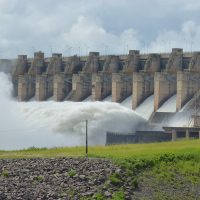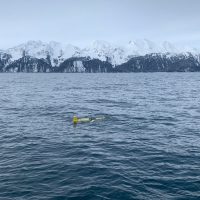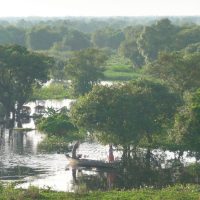Filter Results
The Scientists Fighting for Parasite Conservation
Parasites play an outsize role in balancing ecosystems, and some species may be in danger. Read the article from Scientific American featuring SAFS’ Chelsea Wood.
Read moreProtected tropical forest sees major bird declines over 40 years
SAFS Emeritus Professor Jim Karr began a long-term bird study in Panama 55 years ago while he was a Ph.D. student and later as a professor of ecology at the University of Illinois. He explains that the core of the current study design and its methodology were initiated in 1977. The study continues to this day under its third generation of leadership.
Read moreAwards & Honors (Autumn 21 / Winter 22)
Each year, our students, faculty, and staff win regional, national, and international awards. Please join us in congratulating this year’s group of award winners!
Read moreTime-traveling parasites: Chelsea Wood wins NSF CAREER Award
SAFS Associate Professor Chelsea Wood is the recipient of a 2022 CAREER Award from the National Science Foundation (NSF). This prestigious award will support Wood’s novel research on the historical ecology of parasitism and will allow her to create an active-learning, open-access version of her undergraduate parasite ecology course.
Read moreA decade of deep-reef exploration in the Greater Caribbean
A new paper co-authored by researchers at the Smithsonian’s Tropical Research Institute (STRI) and National Museum of Natural History (NMNH), the University of Washington and the Universidad Nacional Autónoma de Honduras describes the important contribution of submersibles to increasing our knowledge about the diversity of deep-reef fishes in the Greater Caribbean.
Read moreAI model shows how Amazon dams can be made less environmentally damaging
Researchers, including SAFS Assistant Professor Gordon Holtgrieve, have developed a model using artificial intelligence to analyze the environmental impacts of 351 hydropower dam projects currently under evaluation in the Amazon Basin. The model aims to provide information that would help planners and policymakers optimize the capacity and location of new dams to minimize their negative impacts.
Read moreProviding Useful and Usable Science to Decision Makers: How the Lenfest Ocean Program Works
The Lenfest Ocean Program (LOP) funds research projects that address the needs of marine and coastal stakeholders and supports grantees who will engage with the people most likely to use the results. By pulling back the curtain on their processes, the LOP hopes they can help managers, stakeholders and others better understand the many ways in which the philanthropic community can help link useful science with decisions.
Read moreWhy polar bears are walking around with coloured dots on their fur
To find the missing gap in the understanding of hair growth on polar bears, researchers are dyeing parts of their fur with colored dots so they can track the progress visually.
Read moreGretel successfully launched in the Gulf of Alaska
The echosounder-equipped, autonomous underwater glider, Gretel, was launched from the mouth of Resurrection Bay in the northern Gulf of Alaska. After technical adjustments, Gretel will sample the GAK1 line and proceed southeast to rendezvous with the US vessel, the NOAA research vessel Bell M Shimada participating in the 2022 Pan-Pacific International Year of the Salmon High Seas Expedition.
Read moreAnaerobic processes fuel carbon dioxide production in Tonle Sap Lake
Tropical rivers like the Mekong uniquely overflow their banks and flood for much of the year. These regular flood events create the chemical preconditions needed for methanogenesis to occur in waterlogged soils. A new study led by the University of Washington found that anaerobic processes occurring on floodplains of the Tonle Sap, the largest lake in Southeast Asia, are important contributors of the carbon dioxide that is dissolved in surface waters.
Read more








